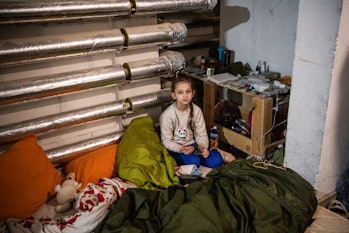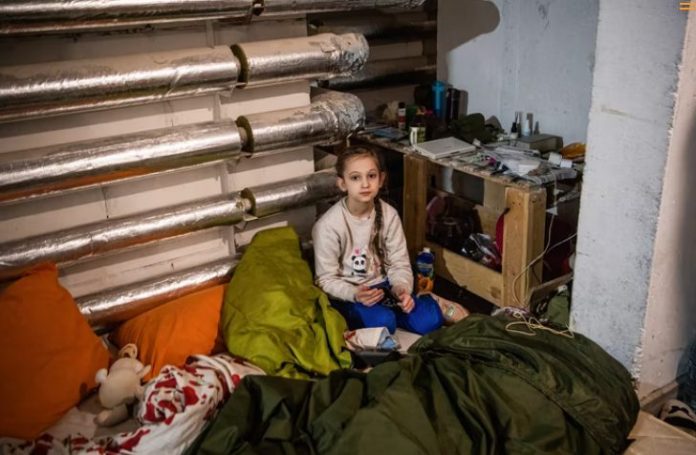This year was always going to be an uphill battle as global health systems recover from the pandemic.
IN RECENT YEARS, conflicts in Ethiopia, Syria, Afghanistan, and Yemen have caused huge suffering. They have devastated the health and wellbeing of local populations and led to countless unnecessary deaths. Russia’s invasion of Ukraine is showing the world, yet again, the abhorrent consequences of war.
As well as the direct casualties of these conflicts, yet more people will suffer illness and death due to disrupted health systems and lack of access to clean water, food, medicines, or simply warmth and shelter. In these desperate conditions, control of infectious diseases breaks down. One such infectious disease is tuberculosis (TB).
TB is an infectious disease spread through coughing. It has killed more people than any other single infectious agent in history, including SARS-CoV-2. TB is curable, but people need support to get through the many months of treatment required.
More difficult to treat are multidrug-resistant TB (MDR-TB) and extensively drug-resistant TB (XDR-TB), which affect half a million people per year.
MDR-TB is a major global public health challenge and a leading cause of death from antimicrobial resistance. It requires a more extensive range of drugs, sometimes for up to 24 months. This, coupled with myriad side effects, makes MDR-TB harder to cure.
The effect of TB and MDR-TB is not only physical but socioeconomic. Being ill with MDR-TB, seeking care, and being hospitalized is associated with out-of-pocket costs and lost income that can be catastrophic.
Previous decades have seen an epidemic of MDR-TB in Russia and former Soviet countries, including Ukraine. Drug resistance thrives on fractured health systems and sporadic medicine supply. Such conditions plagued these states following the breakdown of the Soviet Union, and are exacerbated by war.
But illnesses do not exist in isolation. Untreated HIV is a significant risk factor for TB and this region has experienced rapidly increasing numbers of people living with HIV. Despite reducing TB incidence in recent years, Ukraine still has one of the highest burdens of TB in Europe. Also, it is of great concern that nearly a third of the people affected have drug-resistant TB, with high and increasing rates of MDR-TB and XDR-TB.
The invasion of Ukraine is an impending disaster for TB control across the entire region and potentially beyond. War anywhere lays the foundations for outbreaks and epidemics of infectious diseases from cholera in Yemen, to polio in Syria, and measles in Afghanistan. Indeed, both world wars caused a profound increase in TB deaths.
Wars lead to conditions that are the perfect breeding ground for TB, including food insecurity and overcrowding in poorly-ventilated spaces. This is the dire situation currently facing many people in bomb shelters across Ukraine. Wars ravage healthcare infrastructure, decimate immunization programs, and limit access to quality care. This means unwell people often have late diagnoses, resulting in worse complications and a greater chance of onward transmission.
Over three million people have fled Ukraine following Russia’s recent invasion. This follows extensive recent migrations from Syria, Afghanistan, and Ethiopia, all of which have high MDR-TB prevalence. Such displacement is going to challenge public health responses.

COVID SET BACK EFFORTS TO ERADICATE TB
These challenges come on the backdrop of the Covid pandemic, during which TB notification rates plummeted. This was not because TB suddenly went away. It was due to disruptions in access to TB diagnosis and treatment.
Estimating the pandemic’s true impact on TB infections, disease, and death is complex. However, the World Health Organization has suggested that the pandemic has set back efforts to end TB by more than a decade.
Failure to control TB and MDR-TB will cause untold harm to communities, particularly those made vulnerable by their living conditions. To avoid this, the war in Ukraine and other conflicts must end.
In the meantime, we must provide support to people living in or displaced by conflict. This includes ensuring access to free, quality, person-centered care. Care encompasses TB prevention, rapid diagnostics, resistance testing, and treatment across borders and throughout a person’s migratory journey. But care should be more than just clinical. People with TB and MDR-TB, especially people fleeing conflict, can benefit from social, economic, and psychological support.
This year was always going to be an uphill battle as global health systems recover from the pandemic. The war in Ukraine will only make eliminating TB harder. Investment is key because for every dollar we spend on TB prevention and care, we get 43 back.
If we have learned anything from Covid, it’s that bugs don’t respect borders. Global communities are interconnected like never before.
Ending TB is a fight we all need to invest in.
This article was originally published on The Conversation by Tom Wingfield at the University of Liverpool and Jessica Porter at the Queen Mary University of London. Read the original article here.































Russia has had it good till now
A lot is said about the bad missiles and APCs/Tanks/Choppers ………….
The Russians have just dumped their old and obsolete Military Ordinance, on UKR.It was, in any case,junk, which would have needed to be destroyed.Now,all that obsolete ordinance ,is used up.
Hence, the Putin drawdown on UKR.
In the old days,the Russians would call up the Indian MOD,pay off some politicians and dump the junk missiles,ordinance,tanks,ships and jets to the INDIANS – and then SET A RUPEE-ROUBLE RATE,FOR THIS JUNK – at a low rate – to make the Indians feel, that they are smart.THEN THE RUSSIANS RECOVER THE DISCOUNTED RUPEE-ROUBLE, , by converting the INR into USD ,at a superprofit – ripping off the Indians.
INSTEAD, PUTIN HAS DUMPED HIS OBSOLETE MILITARY ORDINANCE ON UKR,AND ACQUIRED REAL ESTATE WORTH TRILLIONS – IT IS A BETTER DEAL !
SO LONG AS PRC IS WITH PUTIN – PUTIN HAS NO WORRIES
PUTIN IS NOW FOCUSSING ON DONBASS
Should the West hold the sanctions or impose MORE sanctions !
If there are more sanctions,PUTIN will again start his pulverisation
Better to arm UKR, and see the response of Putin
Putin is also waiting to see the West response,to Kiev drawdown,in terms of news sanctions and weapons supplies to the UKR army – and the West response to Roubles for Gas – and whether EU will sanction Russian Oil exports.
There is another angle of the UKR war missed out by media
WATER !
1st thing Putin did when he went in was to blow up the dam,which stopped the water flow to CRIMEA ! Russia spent millions of USD to ferry water to Crimea by land,as UKR had blocked the water after the takeover of CRIMEA – although the rivers flowing into UKR are European rivers – NOT origined in UKR
What did UKR do ? They opened the gates of 3 dams near Kiev to STOP Russian armor.They should have waited for the armor to come near – AND THEN FLOODED THE REGION – that way they would have POW and armor
Spring is coming and Putin has enough land of UKR to start negotiations.
Hence,the Russians are digging in DEEP (for the Nato supplies)
To start the war – Putin HAD TO SELL HIS ARMY AS DIVINE ! His job as Commander ,is to BOOST THE ARMY BEFORE WAR – just like Alexander and Genghsi Khan ! PUTIN KNEW he would not be able to take Kiev.UKR army tactics are like the Soviet/Russian army
Next he bombed out UKR with LOW COST & SURPLUS MISSILES – as that is SUNK COST – & these were known to be INACCURATE.That achieved his 2nd aim – EVACUATION,EXODUS & DESTRUCTION OF INFRASTRUCTURE
Now Putin will use PRECISION WEAPONS – & then ENTER from Belarus
A thrust INTO Kiev from the South & East is NOT viable.
So now it is trench war & MANPAD war from UKR, & Hi-Tech Missiles,from Russian soil & Russian Navy.
Now Putin has to sanitise Dontesk and Donbass and secure its survival – which means WATER supply .Like what the Russians did to the UKR DAM WHICH BLOCKED WATER TO CRIMEA.dindooohindoo